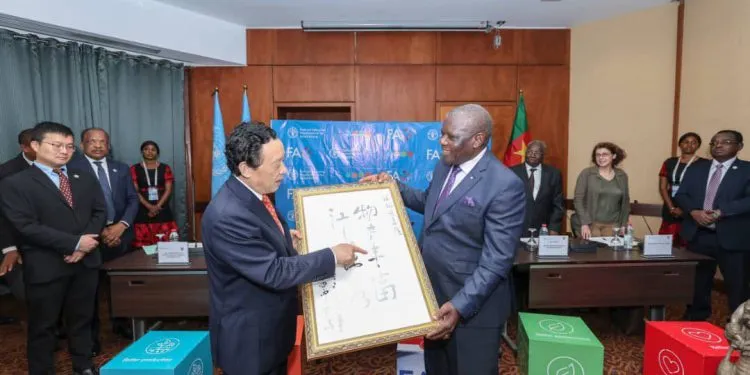By Daniel D.
Dr. Wu Dongyu, Director of the UN Food and Agricultural Organization (FAO) has pledged to help Cameroon to improve the quality of food produced in the country to solve the problem of the acute food shortage.
Dr. Wu was talking while meeting some state officials, including the Prime Minister, Chief Dr. Joseph Dion Ngute, and the Secretary-General at the Presidency of the Republic, Ferdinand Ngoh Ngoh.
Aside from making pledges, the FAO Director-General also signed an agreement to provide FAO’s support to the Government of Cameroon in building the capacity of small-scale farmers in the country’s Eastern Region.
He also signed another partnership deal with the Minister of Agriculture and Rural Development and the Minister of Fisheries and Animal Industries.
These series of partnerships will see the organization support food and nutrition stabilization and rapid response for early recovery and resilience building; strengthening smallholder production capacities through crop and livestock support for climate and nutrition resilience; and support for community preparedness and early warning systems, among others.
Through that, FAO said it will procure and distribute agricultural inputs like improved drought-resistant seed varieties, fertilizers, and equipment for primary production to farmers, 60 percent of whom are women.
“In addition to boosting crop production, support for livestock production is also envisaged, including the distribution of inputs and materials for livestock farmers and mass vaccination campaigns for traditional poultry,” the organization said.
Cameroon is blessed with many varieties of food, but its population is suffering from hunger.
Some causes could result from a lack of modern farming techniques, conflict in the Far North, North West, and South West Regions, and natural catastrophes like floods, droughts, and diseases.
“The climate crisis has impacted the agriculture sector, including livestock and fisheries, as well as other key areas such as health. Given climate variability and the disruptive events observed in the country, FAO supports the project through agricultural and livestock support in the eastern region,” Dr. Wu said.
This is coming at a time when the UN is pleading for funding to thwart the present acute food shortage among an estimated 2.5 million as of April 2024.
According to the World Food Programme, at least 126,700 people are suffering from acute malnutrition in the Far North region, including pregnant and lactating women (3,700), girls and boys (123,000).
Up to 48,800 boys and girls under 5 have developed acute malnutrition in the North West and South West as of 2023.
The Cameroon Government, together with the UN System in the country, recently launched the 2024 Humanitarian Response Plan to target interventions in education, food security, health, nutrition, protection, shelter and non-food items, and water and sanitation.
Agriculture provides a livelihood to around 70 percent of the population, yet it receives less than 2 percent of humanitarian funding for the food sector.



